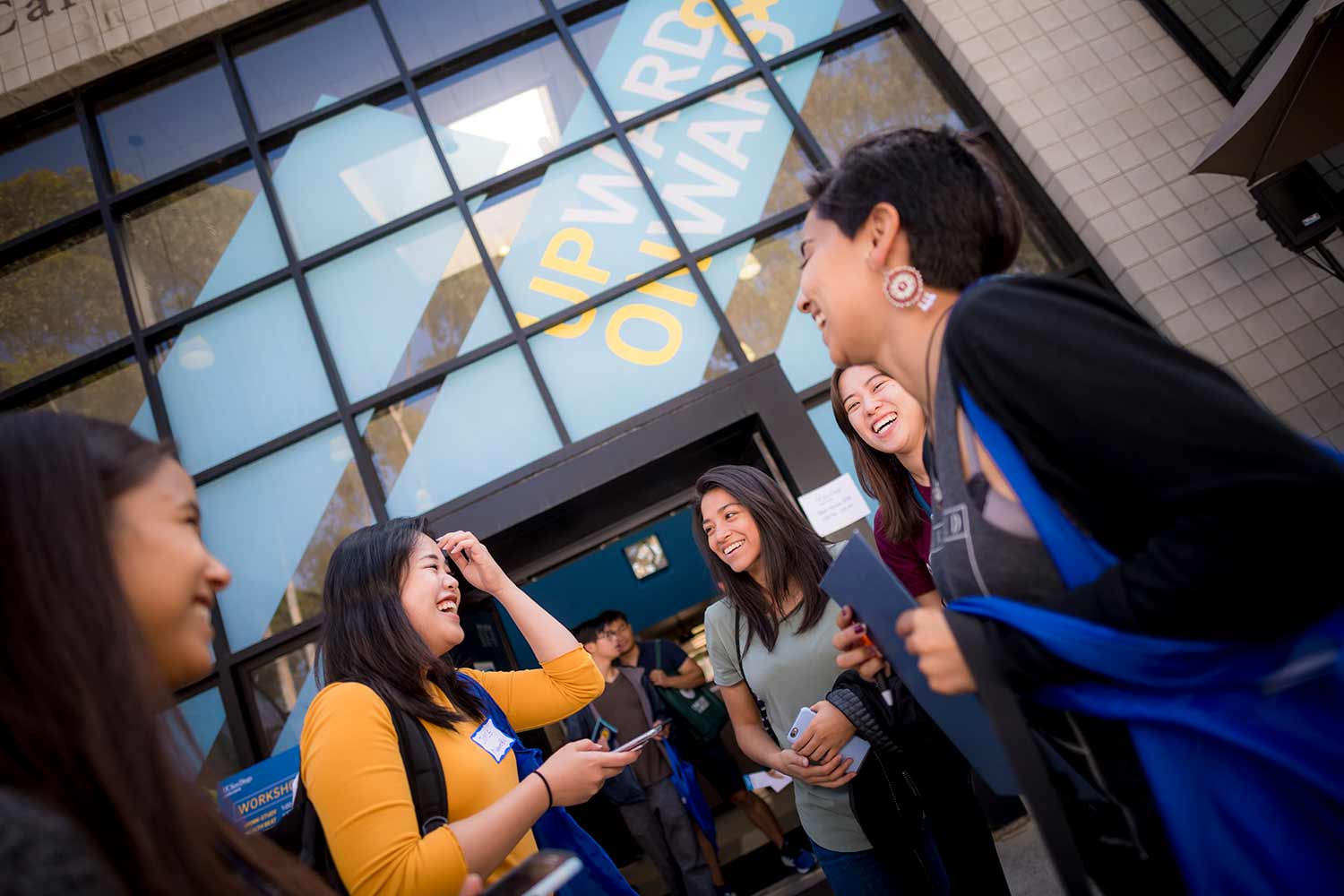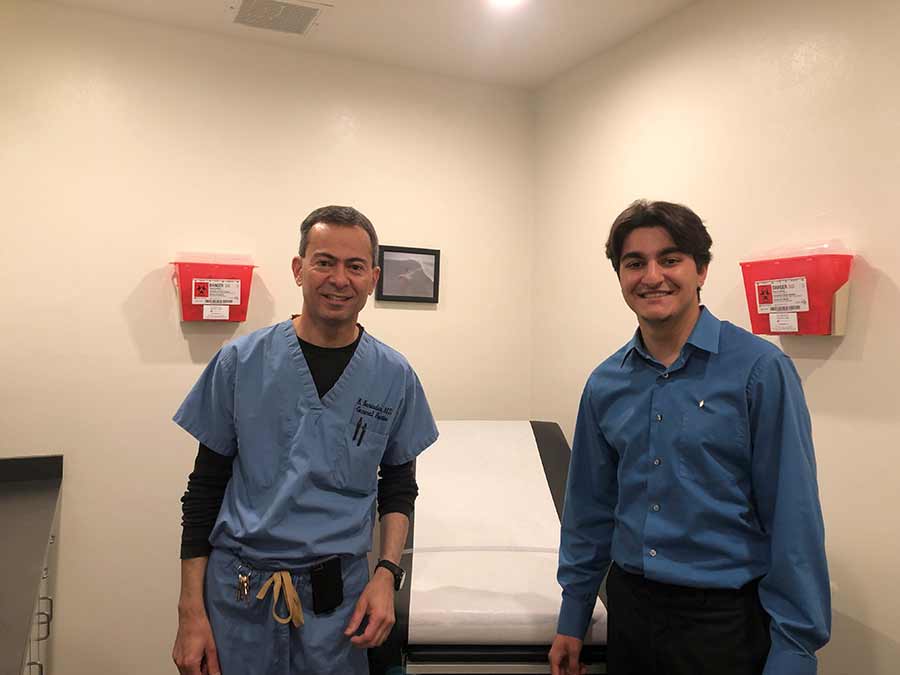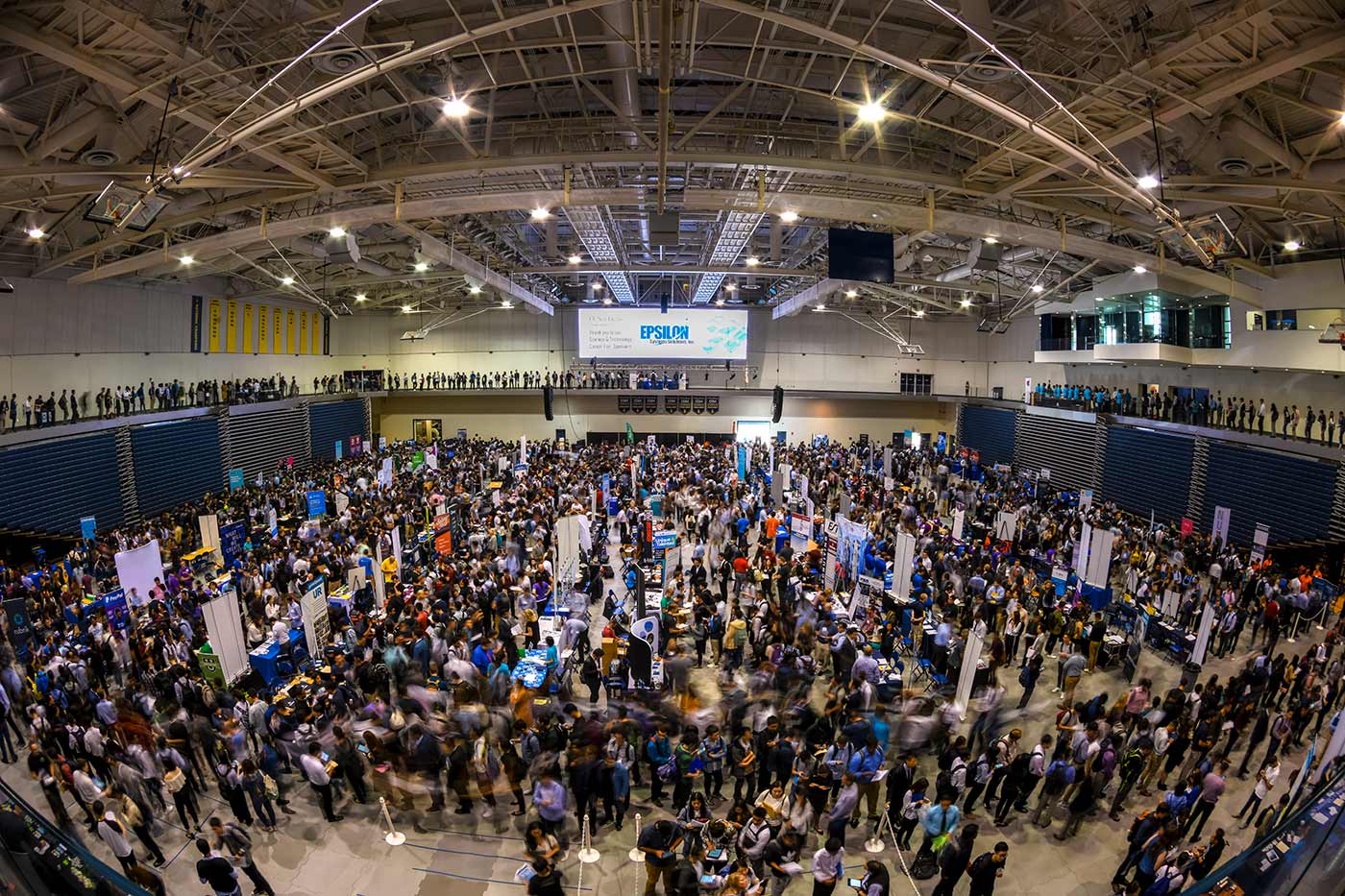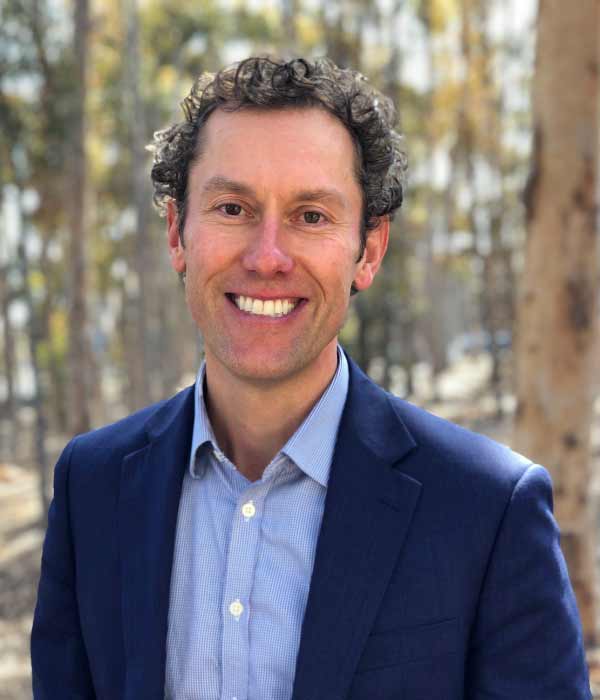
By:
- Amanda Rubalcava
Published Date
By:
- Amanda Rubalcava
Share This:

Students gather outside UC San Diego Career Center. Photos by Erik Jepsen/UC San Diego Publications
Upward & Onward: Gen Z Finds UC San Diego’s Career Center Relevant
As Generation Z—UC San Diego’s current generation of undergraduate talent—prepares to enter the rapidly evolving employment industry, the campus Career Center is shifting gears to stay ahead of the game. To secure a position within today’s competitive job landscape or a place in an elite graduate school, it requires more than a sparkling résumé and an exemplary education. Fortunately, the university knows that possessing multifaceted experiences, skills and valuable networks are what set UC San Diego graduates apart.
“If I knew about all the opportunities that [the Career Center] could provide in my first or second year, then I would have visited a lot more often,” said fourth year Computer Science and Bioinformatics student John Jun. While he initially was on a track to pursue a Ph.D., his involvement in clinical research led him to realize he wanted to become a doctor. Jun quickly recognized the need for a personal roadmap to help him prepare for medical school.

As part of Take a Triton to Work, Physician Behzad Baniadam ’90 led UC San Diego student Rayan Zarei ’22 on a tour of Mission Urgent Care in San Diego.
“I didn't know much about the process at all, and I knew that if I were to seek these volunteering or shadowing opportunities [alone], it would just be a lot of time exploring what’s out there. I decided to come to the Career Center so that I can get more direct information,” said Jun. His first time visiting the Career Center was as a senior—something that is not uncommon within higher education institutions nationwide. In fact, fewer than 20 percent of undergraduate students reach out to their school’s career centers for advice on finding jobs or finding and applying to graduate programs, according to a report by Gallup and the Strada Education Network.
The Career Center is pivoting existing structures, piloting experiential programs and increasing alumni involvement to shape the job industry’s newest players. Since joining the university’s Career Center staff in March 2018, Executive Director Kris Hergert has been on a mission to refine innovative initiatives that guide students toward outcomes—whether that means a job, internship or graduate school. For example, after hearing campus feedback that the longstanding two-day career fair format was causing some students to miss class, Hergert integrated both events into one impactful day of networking with industry titans from Salesforce to Intel.
“When you go to a career fair, you’re going to potentially have that opportunity to talk one-on-one with somebody. That’s the real moment of talking to somebody and telling your story,” said Hergert. Answering questions about who you are, what you offer and why you want the job is a skill that takes work, he shared. “The reality is that we really want to give students a broad opportunity so they can practice that.” A 2019 Yello recruiting study also found that 51% of Generation Z prefer face-to-face interactions. It is shown that members of this generation still place value on personal human connection, despite growing up in a technology-driven world.
Beyond the hard skills that students learn from class lectures and lab sessions, the center is placing an emphasis on these “real moments” that impart fundamental skills to students. As a resource designed to create well-rounded individuals, a core element of the center’s focus revolves around experiential learning: the process through which students get an education from real-life experiences such as interning, networking, volunteering, conducting fieldwork, studying abroad and other hands-on activities. At the Career Center, students are encouraged to take advantage of opportunities ranging from assisting in stem cell research to interning in public policy.

Students, alumni and recruiters fill the floor of RIMAC Arena for the UC San Diego Career Fair.
This past spring, the importance of experiential learning fueled the Career Center and alumni office to develop a pilot program entitled Take a Triton to Work. More than 120 undergraduate and graduate students connected one-on-one with alumni from their hometowns, building professional relationships and exploring industries through the eyes of a UC San Diego graduate. The pilot was so successful that it is being launched on a global level this December to benefit more alumni mentors and student participants. The open application period to secure volunteer alumni hosts and students is now open and ends Nov. 14. With the ability to leverage the power of more than 200,000 alumni, the Career Center is finding new ways to tap into its alumni network to further the career pursuits of all students.
While Gen Z are digital natives born in a world permeated by social networks and the internet, in-person connection and coaching remain crucial in developing employable graduates. The Career Center is working alongside the university’s alumni office to foster these real life connections, further enabling the center to increase outreach to employers and alumni advocates.
Increasing alumni involvement is one of the main priorities of Paula Thomas, a 1987 UC San Diego graduate who is director of alumni career and professional development. To strengthen alumni engagement with students, Thomas welcomed alumni recruiters to represent their companies at the recent career fair. That same day, she also piloted a program where alumni job seekers were invited back to campus for a casual networking mixer with employers. “If we can support alumni connections to UC San Diego and they feel welcome to return to campus for an opportunity to grow personally and professionally, then from our perspective, that’s a win,” said Thomas.
For Rita Lopez, a 2019 UC San Diego graduate with a Literatures in English major, the pressure to find a job intensified after she left the university. As an alumna, casual networking events curated by the Career Center and the alumni office helped her to confidently take the next steps in her career.
“It’s interesting to see everybody in one area,” said Lopez of the mixer. “We’ve all been through it already and now we’re on to the next part of our lives, so I feel like there's more of a relatability between us.”
While evolving to support its newest undergraduate class, the campus resource remains steadfast in supporting all students no matter where they are in their academic or professional journey. Alongside support from strategically aligned campus partners, the center has undergone a structural reimagining to shape a new way for past and present students to receive specialized assistance. The center has been reorganized by area of study into nine “Seal Teams” ranging from marine sciences to business. Trained coaches and advisors provide current and targeted guidance on industry trends, expectations, and ways forward—giving each individual student goals for the future. The center also engages industry experts, who foster partnerships and collaboration with hundreds of employers and other academic institutions.
Students are advised to use Career Center services early in their undergraduate journey to help uncover and strengthen the traits employers and universities are looking for in prospective candidates. At the start of the academic year, the center rolled out its revamped Career Center website and the Triton Career Guide, an interactive workbook outlining how students can develop their résumé, prepare for secondary degrees, identify key competencies and more. Students are invited to download the guide online or visit the center for a copy.

Executive Director of the Career Center Kris Hergert.
The Career Center also works in conjunction with the Teaching + Learning Commons, UC San Diego’s innovative infrastructure for advancing teaching excellence and student success. Services provided by the campuswide resource range from peer-led study groups for undergraduates to professional development programs for educators. The Career Center encourages students to use the Co-Curricular Record (CCR), an engaged learning tool offered by The Commons that shares their activities, achievements and skills developed outside the classroom on a verified record. As a physical report that highlights competencies obtained through academic, co-curricular and experiential learning, the CCR is a fundamental tool that UC San Diego students can use to tell their story to future employers as well as graduate and professional schools.
“Distinct to our university, the CCR highlights twelve competencies that students should develop during their time at UC San Diego. These competencies are 21st century transferable skills, ranging from teamwork and cross-cultural collaboration to professionalism and integrity,” said Gabriele Wienhausen, faculty director of the Teaching + Learning Commons. As a resource for employability and active community engagement, the CCR further serves as record of talking points that a student can use during interviews for scholarships, jobs and graduate school admissions.
As the slogan on its glass window suggests, UC San Diego’s Career Center is designed to push students “Upward & Onward” in their professional and personal journey. Ultimately, to best prepare students for successful futures, the center emphasizes the importance of opportunities that shape multifaceted future employees and global problem solvers.
“I really want people to think life is about duality,” Hergert shared. “It’s not just about being smart. It’s about the ‘and’: the additional skills, strengths and qualities that a student brings to the employer—and you get hired for all these aspects as a whole.”
To learn more about the Career Center and to access career resources, visit career.ucsd.edu or email careercenter@ucsd.edu.
Share This:
You May Also Like
Stay in the Know
Keep up with all the latest from UC San Diego. Subscribe to the newsletter today.


